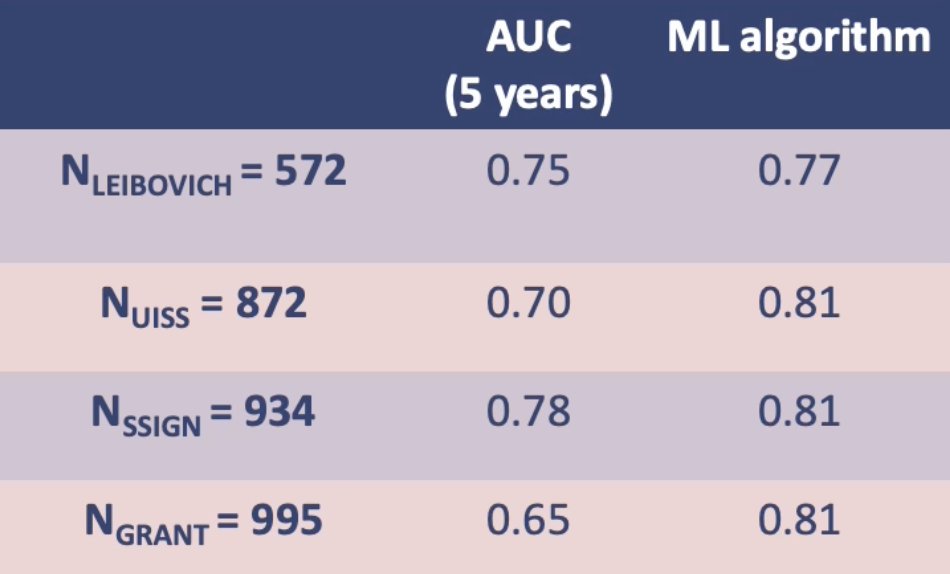(UroToday.com) The 2023 EAU annual meeting included a session on locally advanced kidney cancer, featuring a presentation by Dr. Gaelle Margue discussing the development of an individual postoperative prediction model for kidney cancer recurrence using machine learning. Kidney cancer is of increasing incidence worldwide. It is most often diagnosed at a localized stage where surgical management is the gold standard, however 20-50% of patients will recur after surgery. Current available prognostic scores offer moderate predictive performance which leads to difficulties in establishing follow-up recommendations for patients after surgery and selecting patients who could benefit from adjuvant therapy. The objective of this study was to develop a model for individual prediction of the recurrence risk after surgery using machine learning.
From the French research network on kidney cancer prospectively maintained database UroCCR (NCT 03293563), a cohort of patients undergoing surgery between May 2000 and January 2020 for a localized or locally advanced renal cell carcinoma (pT1-T4, N0, M0) was analyzed. Patients with a genetic cancer, a concomitant malignant disease, or a chronic inflammatory disease were excluded. For each patient, clinical, biological, histological, and radiological data were collected. Participating sites were randomly assigned to the training or testing cohort with a 67/33 ratio of patients. Missing data were multiply imputed using the MICE algorithm and gradient boosted trees. The primary endpoint for this study was disease free survival. Several machine learning algorithms were trained on the training data set and parameters of each algorithm were optimized using repeated cross-validation procedure (5x10 folds). C-index at 5 years was used as optimization metric. The predictive performance of the algorithm was then evaluated on the test dataset using C-index and time-dependent AUC.
In total, 3,254 patients were split in a training and test cohorts of 2,239 and 1,115 patients, respectively. The included patients were 70.8% male, a median age of 62 years (IQR 52-69), had tumors with a mean size of 4.0 cm (IQR 2.8 – 6.2), and 71% of clear cell RCC. Over a median follow-up of 30 months, the 5-year disease-free survival probability was 73.3%, and median disease free survival was 12 years. Among these patients, 3.6% had locoregional recurrence, 7.9% had metastatic progression, and 2.6% died:

The best results in DFS prediction were obtained using a Cox PH model including 20 variables with a C-index of 0.76 and an AUC of 0.72 at 5 years:

Comparatively, the C-index of other algorithms were as follows:

Shapley values graphs were generated to display the predicted DFS and the relative contribution of each feature leading to the personalized prediction.

Dr. Margue concluded this presentation discussing development of an individual postoperative prediction model for kidney cancer recurrence using machine learning with the following take-home messages:
- Machine learning applied to data from patients undergoing surgery for localized or locally advanced kidney cancer appears to provide good individual DFS predictions comparing to usual scores
- This data may help with management and patient counselling, as well as identify very high risk or very low risk patients for recurrence
Presented by: Gaelle Margue, MD, Bordeaux University Hospital, Dept. of Urology, Bordeaux, France
Co-Authors: Ferrer L.2, Etchepare G.2, Bensalah K.3, Mejean A.4, Roupret M.5, Doumerc N.6, Ingels A.7, Boissier R.8, Pignot G.9, Parier B.10, Paparel P.11, Waeckel T.12, Bigot P.13, Colin T.2, Bernhard J-C.1
Affiliations: 1Bordeaux University Hospital, Dept. of Urology, Bordeaux, France, 2Sophia Genetics, Multimodal Research Team, Pessac, France, 3Rennes University Hospital, Dept. of Urology, Rennes, France, 4HEGP-APHP, Dept. of Urology, Paris, France, 5La Pitié APHP, Dept. of Urology, Paris, France, 6Toulouse University Hospital, Dept. of Urology, Toulouse, France, 7Mondor-APHP, Dept. of Urology, Paris, France, 8APHM, Dept. of Urology, Marseille, France, 9IPC, Dept. of Urology, Marseille, France, 10Kremlin-Bicêtre -APHP, Dept. of Urology, Paris, France, 11HCL, Dept. of Urology, Lyon, France, 12Caen University Hospital, Dept. of Urology, Caen, France, 13Angers University Hospital, Dept. of Urology, Angers, France
Written by: Zachary Klaassen, MD, MSc – Urologic Oncologist, Assistant Professor of Urology, Georgia Cancer Center, Augusta University/Medical College of Georgia, @zklaassen_md on Twitter during the 2023 European Association of Urology (EAU) Annual Meeting, Milan, IT, Fri, Mar 10 – Mon, Mar 13, 2023.


